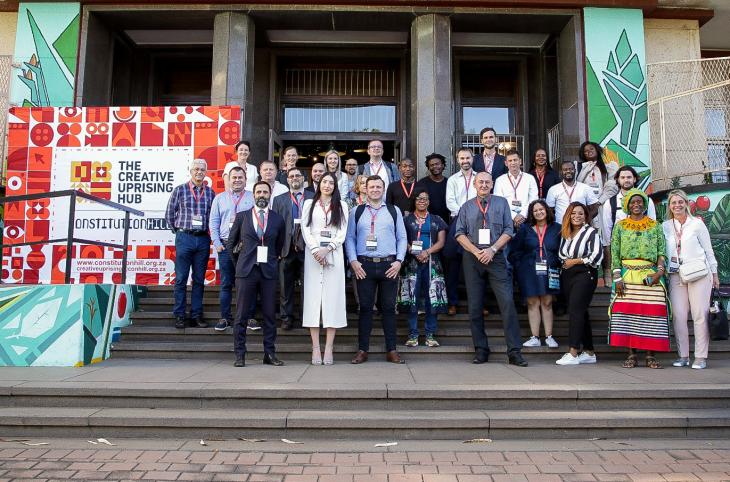Connecting Clusters and Continents: The EU-South Africa Matchmaking Event in Johannesburg
Johannesburg recently hosted the European Cluster Collaboration Platform EU-South Africa Matchmaking Event, unfolding from 24-26 October 2023. Jointly organised by the European Commission and The Department of Small Business Development (DSBD) of South Africa, and in collaboration with the EU Delegation to South Africa, the Enterprise Europe Network (EEN) and the European Cluster Collaboration Platform (ECCP), the 3-day programme was designed to foster business connections, enable knowledge exchange and propel innovative collaborations across sectors and continents. This was the first time that the European Commission has organised such an event in Sub-Saharan Africa, and as such in itself represented strides towards new and exciting opportunities and relationships.
The event was an ideal platform for participants from the EU and South Africa to engage in fruitful Cluster to Cluster (C2C), Cluster to Business (C2B), and Business to Business (B2B) collaborations. Specifically, the event shone a spotlight on areas such as Agri-food, Green Industries, Chemicals and Metals, Tourism, Transport (both Maritime and Automotive), Digital Tech, Textiles and Leather.
The European delegation was made up of 14 Clusters and 4 SMEs from across Bulgaria, Romania, Portugal, France, Serbia, Poland, Hungary and Finland. The South African delegation comprised 17 organisations, including clusters.
Since the EU and South Africa concluded a Trade, Development and Cooperation Agreement (TDCA) in 1999, the two parties have enjoyed solid and growing trade relations. To this day, the EU represents the most significant source of foreign direct investment in South Africa. South Africa is also the second largest economy in Sub-Saharan Africa.
Day One: Setting the Stage for Collaboration
The first day of three was held at Constitution Hill, a former prison and military fort that now tells the story of South Africa’s journey to democracy. Proceedings commenced with a series of opening speeches by officials from both sides. Kicking things off, Jeffrey Ndume, Acting Director General of The Department of Small Business Development (DSBD) of South Africa, spoke to the importance of the long-standing relationship between the EU and South Africa:
“We are very grateful for this strategic partnership…The relationships that have been started [here] will create fruitful opportunities on both sides and strengthen the connection between both countries”
He then went on to describe the importance of such opportunities in allowing the South African cluster ecosystem to learn from the European, especially with regard to cluster development and integrating SMEs into supply chains.
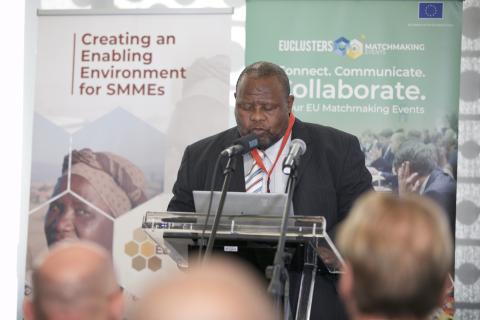
Next up was Fulgencio Garrido Ruiz, Deputy Ambassador of the European Union to the Republic of South Africa. Excitingly, Mr Ruiz announced a new investment strategy being rolled out by the EU to boost infrastructure in a number of key sectors such as Transport, Energy and Digital, whilst at the same time aiming to strengthen systems of education and research. His announcement came with the addition that this process has already been started in South Africa. He finished by underscoring the importance of collaboration, saying: “In this uncertain and unpredictable world, we are always stronger working together - cluster development is a key tool to drive innovation and development”.
In a similar vein, our following speaker, Jakub Boratynski, Director for Networks and Governance, DG GROW, European Commission, signalled towards a strong commitment from the Commission to work on SMEs and cluster collaboration with South Africa. Addressing the room via video message, he stated: “We believe that clusters are a fantastic tool to actually help SMEs and create business links. They have demonstrated many times what a precious resource they are in terms of identifying paths towards innovation and expansion for SMEs”.
Wrapping up the opening series of talks was Sibonelo Nzimande, Chief Director: Tourism Development at the Department of Economic Development, Tourism and Environmental Affairs (KwaZulu-Natal Province). Mr Nzimande’s address focused on the tourism sector in South Africa, and specifically on the role of clusters in this sector. As a diverse ecosystem, he outlined how clusters are key if you are to benefit from varied inputs as part of the tourism value chain, a concept that he then highlighted is equally applicable to other sectors.
In order to demonstrate the tangible impacts of EU-South Africa collaboration, we next heard from Dr Nomusa R Dalmini representing The Council for Scientific and Industrial Research, who introduced the NovelQ and EU-After projects - both of which are built on EU-South African collaboration.
Following what was a fantastic opening from all speakers, we were treated to a pitching session where those in attendance were able to put themselves and their organisation forward to the rest of the delegation. Both European and South African participants seized this opportunity to showcase their ideas and proposals in sectors ranging from Maritime to Nanotechnology. This session had the dual purpose of introducing those in attendance to one another and setting the stage for the bilateral matchmaking meetings that started swiftly after.
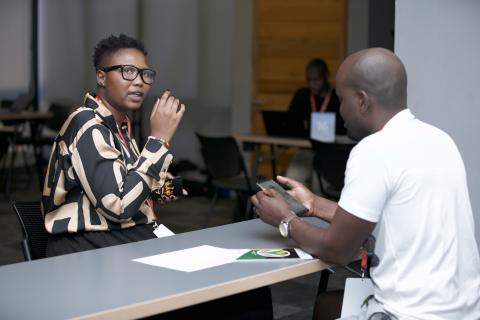 |
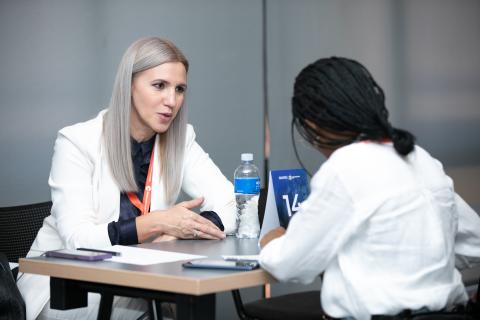 |
These meetings were the climax of an already insightful and valuable day. Over the three hours of their duration, participants engaged in a rigorous schedule, allowing them to find partners and expand their networks into each other’s markets and ecosystems. In this time, we managed to facilitate 88 bilateral meetings between European and South African participants. Following the meetings, Andre Carvalho of Associação Cluster Portugal Mineral Resources commented that “now, a new bridge can be made between Europe and Africa”.
To name but a few immediate results:
-
A cooperation opportunity arose with a multinational company and PRODUTECH – Production Technologies Cluster, who are fostering the scheduling of a follow-up meeting to present the specific needs of the multinational to PRODUTECH's members, enabling the potential establishment of concrete business collaboration cases.
-
Adrienne Gentil of Valorial (French agrifood cluster in Western France) found good opportunities to leverage several EU projects that they are currently partners in. She found that the South African counterparts may benefit from elements of these projects and have initiated discussion on later proposals to build on together.
-
Andre Carvalho stated, “We have made a lot of contacts, built the pillars to establish bridges and found some opportunities to be explored within the mining value chain. We found a South African company using recycled materials to build bricks and we now hope to take innovations such as this, and those that we have in Europe, to hopefully undergo a knowledge transfer”.
The day then shifted gears with a site visit to Johannesburg's Creative Uprising Hub at Constitution Hill, giving attendees a unique insight into the region's creative pursuits. The day’s events came to a close with a networking dinner, creating a relaxed ambience for participants to build relationships and further share ideas.
Day Two: Exploring Opportunities and Bridging Gaps
Day two began with a visit to Manufacturing Indaba, the leading manufacturing event in Sub-Saharan Africa. Participants were given two customised presentations from Trade & Investment KwaZulu-Natal and the South African Oil & Gas Alliance. They were also able to explore booths that catered to their specific industry interests and needs, as well as being treated to other talks and panel discussions on various relevant industry topics.
The afternoon was marked by B2B Connect sessions, Manufacturing Indaba’s internal platform offering further networking and matchmaking opportunities for the EU delegates with participants at the trade fair. The day culminated with a debriefing session providing attendees an opportunity to reflect on their experiences and share feedback.
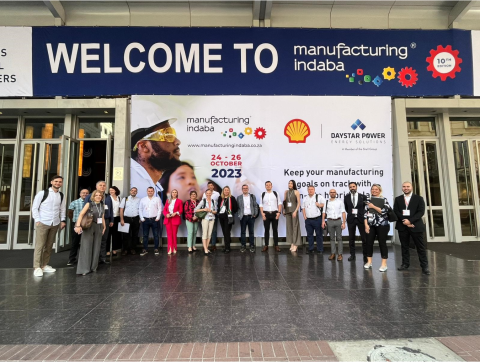
Day Three: Diving Deeper into Innovation
The final day was characterised by two insightful visits to local industry hubs in Pretoria, covering different industry themes. Participants first explored the CSIR (The Council for Scientific and Industrial Research), a centre undertaking direct, multidisciplinary research and technological innovation in the fields of Advanced Agriculture and Food, Health, Manufacturing, Defence and Security, Smart Places and more - in part through the 9 clusters that it encompasses. Concurrently, some participants opted to explore the Automotive Industry Development Centre, established as a support centre to strengthen global competitiveness in the local automotive industry and to bolster the position of Gauteng as an automotive industry destination of choice.
In Retrospect: A Beacon of Collaboration and Progress
The EU-South Africa Matchmaking Event was more than a mere networking platform; it represented a melting pot of ideas, innovations, and potential partnerships. As attendees departed back to their respective regions, they took with them new contacts, innovative project ideas and a renewed zeal for forging a stronger EU-South Africa alliance. However, the real work is yet to be done. These contacts now need to be transformed into tangible and beneficial collaboration cases for both sides.
Highlights video: EU-South Africa Matchmaking Event 2023
For those who couldn't be there, do not despair. Dive into the visuals and recap this unforgettable event:
📸 Photos from the Johannesburg mission.
Dive deeper into the Matchmaking event in Johannesburg!
🌍 Explore our upcoming ECCP events to immerse yourself in similar occasions.
